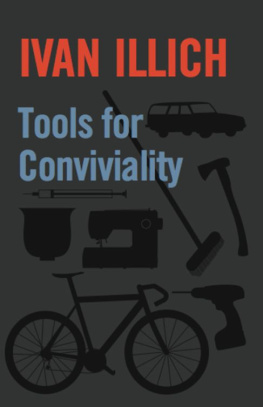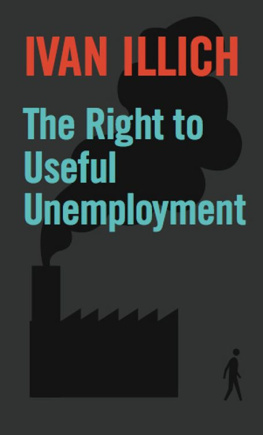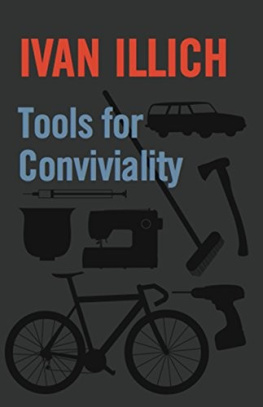I am grateful to Marion Boyars for publishing this collection of essays in an original soft cover edition with just enough hard bound copies to satisfy librarians. These are indeed essays, or drafts. Each reports some aspect of the progress I have made on a book I shall finish within the next three years. Each was originally addressed to a different audience in 1979 and 1980. I have decided to publish them together now in order to call attention to an urgent issue without, however, rushing to a premature conclusion of my major study on the history of scarcity.
The essays gathered here deal with the rise of the shadow economy. I have coined this term to speak about transactions which are not in the monetized sector and yet do not exist in pre-industrial societies. The acquisition of taught mother tongue is an example on which I elaborate in this book.
From Karl Polanyi I take the idea that modern history can be understood as the disembedding of a market economy. However, I do not analyze this uniquely modern, disembedded economy from the perspective in which the concepts of formal economics can be meaningfully applied to it. Rather, I am interested in its shadowy underside. I want to describe those of its features which escape both the categories of formal economics , and those which anthropology finds applicable in the study of subsistence cultures. Looking at early nineteenth century history, I find that with the progress of monetization a non-monetized and complementary hemi-sphere comes into existence. And both these hemi-spheres are equally, however differently, foreign to what prevails in pre-industrial societies. Both degrade the utilization value of the environment; both destroy subsistence.
With the rise of this shadow economy I observe the appearance of a kind of toil which is not rewarded by wages, and yet contributes nothing to the households independence from the market. In fact, this new kind of activity, for which the shadow work of the housewife in her new non-subsistent domestic sphere, one prime example is a necessary condition for the family wage earner to exist. Thus shadow work, which is as recent a phenomenon as modern wage labor, might be even more fundamental than the latter for the continued existence of a commodity-intensive society. Its distinction from the vernacular activities typical for subsistence-oriented popular cultures is the most difficult and the most rewarding part of my research.
My study is not motivated by mere curiosity. I am moved by concern over a trend which manifested itself during the seventies. During this time professional, economic and political interests converged on an intense expansion of the shadow economy. As ten years ago Ford, Fiat and Volkswagen financed the Club of Rome to prophecy limits to growth, so they now urge the need for self-help. I consider the indiscriminate propagation of self-help to be morally unacceptable.
What is here propagated as self-help is the opposite of autonomous or vernacular life. The self-help the new economists preach divides the subject of social policy (be it a person or entity) into two halves: one that stands in a professionally defined need, and the other who is professionally licenced to provide it. Under the policies that are thus labelled as self-help, the apartheid of production and consumption, characteristic of industrial economics, is projected into the subject itself. Each one is turned into a production unit for internal consumption, and the utility derived from this masturbation is then added to a newfangled GNP. Unless we clarify the distinction between this self-help and what I shall call vernacularlife, the shadow economy will become the main growth sector during the current stagflation , the informal sector will become the main colony which sustains a last flurry of growth. And, unless the apostles of new life styles, of decentralization and alternative technology and conscientization and liberation make this distinction explicit and practical, they will only add some color, sweetener and the taste of stagnant ideals to an irresistibly spreading shadow economy.
The distinction I make between shadow work and the vernacular domain is thus not of merely academic importance. The distinction is crucial to understand the third stage into which the public discussion on the limits to growth is just now entering.
The first stage occurred more than ten years ago. Then, newsmakers within the universities and in the media suddenly focused public attention on the obvious danger that soon the biosphere might be rendered uninhabitable unless the prevailing trends of industrial production were changed. The alarms stressed the physical environment, and the ensuing discussions tended to be monopolized by concerns about fuels and poisons. It seemed important, then, to call attention to the need for analogous limits in the service sector. This I tried to do with DeschoolingSociety. There I argued that the service agencies of the Welfare State inevitably lead to destructive side effects which can be compared to the unwanted side effects which result from the overproduction of goods. Limits on care had to be envisaged as the necessary complement to limits on goods. Further, both kinds of limits were fundamentally independent from political choices or technological fixes. In the meantime, such limits to care have been recognized: limits to the medicalization of health, to the institutionalization of learning, to the insurance of risks, to the intensity of media exposure, to the tolerance for professional social work and care all now form part of the discussion on the ecology.
With the Eighties, the discussion on the limits to growth is moving into a third stage. The first stage had focused primarily on goods, the second on care. The third is focussing on the commons.
Speaking of the commons, one immediately imagines meadows and woods. One thinks of the enclosure of pastures by which the lord excluded the peasants single sheep, thereby depriving him of a means of existence marginal to the market, and forcing him into proto-industrial wage labor. One thinks of the destruction of what E. P. Thompson called the moral economy. The commons now under discussion are something much more subtle. Economists tend to speak about them as the utilization value of the environment. I believe that in its third stage the public discussion on limits to economic growth will focus primarily on the preservation of these utilization values, values which are destroyed by economic expansion, whatever form it takes.
In principle, the reason for this is not difficult to understand. Up to now economic development has always meant that people, instead of doing something, are instead enabled to buy it. Use values beyond the market are replaced by commodities. Economic development has also meant that after a time people must buy the commodity, because the conditions under which they could get along without it had disappeared from their physical, social or cultural environment. And the environment could no longer be utilized by those who were unable to buy the good or service. Streets, for example, once were mainly for people. People grew up on them, and most became competent for life by what they learned there. Then streets were straightened and reshaped to serve vehicular traffic. And this change occurred long before schools were abundant enough to accommodate the young who were now driven from the streets. The utilization value of a formerly common environment for learning disappeared much faster than it could be replaced by institutions for formal instruction.









